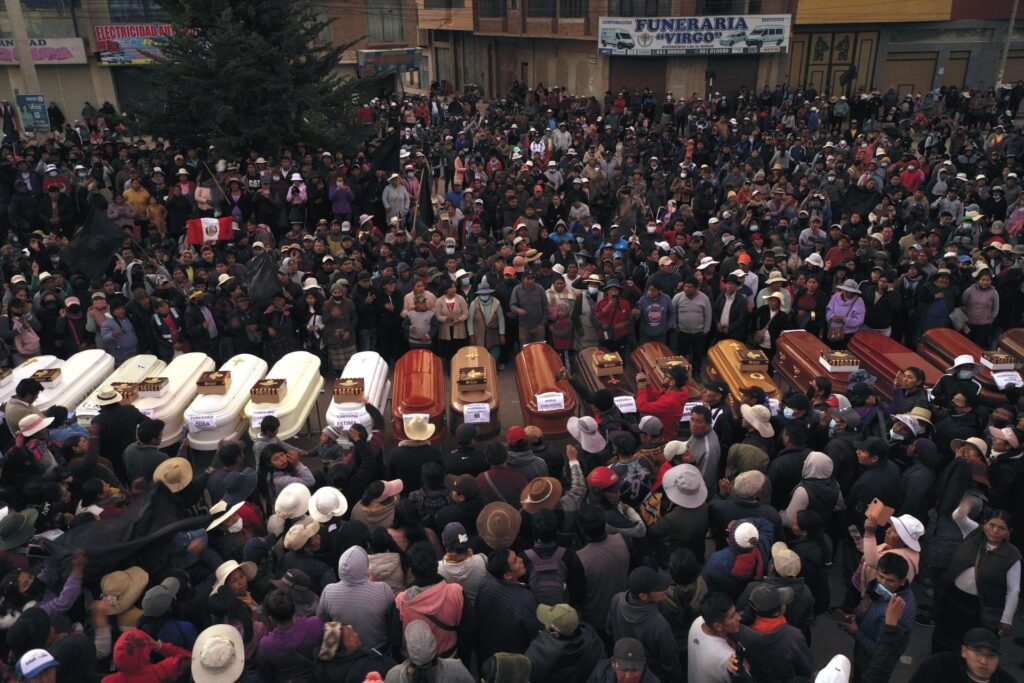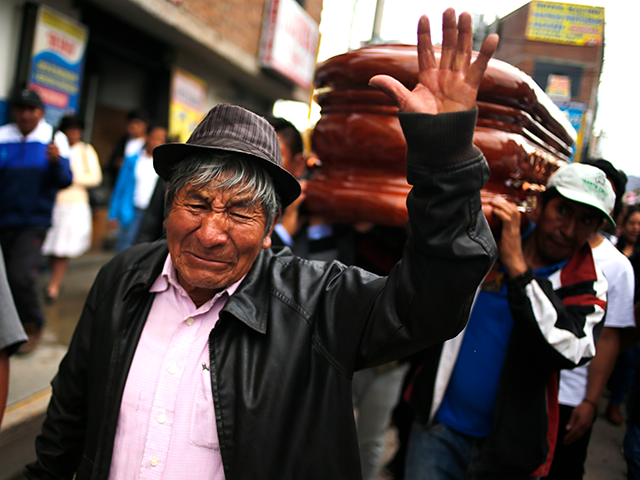Members of the Peruvian Marxist terrorist organization Shining Path are involved in the ongoing nationwide wave of protests that erupted in Peru, Peru’s National Police (PNP) revealed this weekend.
General Óscar Arriola, the head of the National Police of Peru’s Counter-Terrorist Directorate (DIRCOTE), made the assertion on Thursday, after PNP conducted an operation that culminated with the arrest of Rocío Leandro Melgar — also known as “Comrade Cusi” — alongside six other people reportedly helping organize the deadly riots in the Peruvian region of Ayacucho.
“Let the populace know, that they have every right to protest peacefully, that there is no doubt that there are members of Shining Path on the sidelines,” Arriola stated.
Melgar was part of the Marxist terrorist organization Shining Path, responsible for the death of 25,000 people in the Peruvian countryside in the 1980s and 1990s as part of its “People’s War” to violently impose communism on Peru.
Shining Path was largely dismantled during the presidency of conservative Alberto Fujimori. Fujimori launched a nationwide operation to eliminate the group and captured its leader, Abimael Guzmán, in 1992. In 2014, Guzmán was also tried for a separate bombing attack in Lima that took place in 1992.
Fujimori displayed Guzmán in a cage wearing a cartoon-style jail uniform upon his capture. Guzmán died in prison in 2021.
Shining Path did not resurface in any significant capacity until 2015, under the presidency of leftist Ollanta Humala. At the time, they were estimated to boast only 350 members. Although largely diminished, Shining Path survives today through drug trafficking, operating within the Valley of the Apurímac, Ene, and Mantaro rivers (VRAEM) area of Peru.
In an interview given to Peruvian newspaper El Comercio and published on Sunday, General Arriola explained that during her time with Shining Path, “Comrade Cusi” was in charge of giving the “coup de grace” to the victims of the terrorist organization identified as targets, whether they be authorities or regular people opposed to their objectives.

Residents surround coffins during a vigil for the more than a dozen people who died during the unrest in Juliaca, Peru, Tuesday, January 10, 2023. (AP Photo/Jose Sotomayor)
For the past month, Peru has been subjected to a wave of deadly left-wing riots where 50 people have died so far. The riots erupted in response to the arrest of communist former President Pedro Castillo after his failed attempt to stage a coup d’etat by dissolving Congress before they could impeach him.
In December, during the first days of the riots, General Arriola stated that members of the Shining Path who had been released from prison had been rioting alongside members of another terrorist group, the Túpac Amaru Revolutionary Movement. On Friday, Iber Maraví, Castillo’s former labor minister, led a rally that demanded the liberation of “Comrade Cusi” and the other detainees linked to Shining Path.
The left-wing protesters initially demanded the liberation of Castillo, the resignation of current president Dina Boluarte, the closure of Congress, and new general elections before the currently scheduled date in 2026. They have since added a demand for an entirely new Peruvian constitution.
According to a poll conducted by the Peruvian Institute of Studies (IEP) between January 7-12, 69 percent are in support of establishing a Constituent Assembly to draft the constitution. Of these, 40 percent of respondents said a new constitution must be drafted, while 45 percent prefer that only some modifications to the current constitution take place.
Boluarte responded to demands for a Constituent Assembly on Tuesday by describing them as a pretext to keep blocking the nation’s roads. She insisted that, as president, she should not have the authority to promote a Constituent Assembly.
“The constituent assembly and new constitution is not an overnight issue, brothers and sisters from southern Peru, it is a job that the population itself has to do,” Boluarte stated. “You who are there, organize yourselves so that you can have that constituent assembly, it does not correspond to Dina Boluarte, it does not correspond to the Executive. You are being deceived when they say that it is Dina Boluarte who has to resolve the issue of the constituent assembly. That is not true.”
In addition to Shining Path’s alleged involvement in the ongoing leftist riots, Peruvian authorities have accused foreign leftist groups of inciting mob violence and promoting separatism in the southern region of Puno, with former far-left Bolivian President Evo Morales is standing among those accused by Peru’s government.
Christian K. Caruzo is a Venezuelan writer and documents life under socialism. You can follow him on Twitter here.

COMMENTS
Please let us know if you're having issues with commenting.